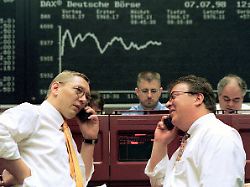Germany’s leading index turns 35
How the DAX became the DAX
7/1/2023 4:36 p.m
Its founders saw it in a league with the American Dow Jones. Today, the DAX is one of the most important stock market barometers in the world. However, most of the private investors in this country still miss out on his price gains.
The DAX is the DAX after all: When Commerzbank returned to the prestigious first stock exchange league at the end of February 2023, CEO Manfred Knof almost exuberantly rang the bell to start trading on the Frankfurt stock exchange floor. Predecessor Martin Zielke calmly commented on the descent of the DAX founding member from the leading German index in autumn 2018 – of all things in the year of the 30th DAX anniversary: ”Nothing will change at all in terms of the importance of the bank for the German economy.”
In fact, membership in the now 35-year-old German stock index is not just a question of prestige. A place in the showcase of the German economy guarantees attention and attracts international investors. Index funds (Exchange Traded Fund/ETFs) that replicate the composition of the Dax have to shift depending on the composition of the index, which usually has an impact on the share prices of certain stocks.
The DAX, which was introduced on July 1, 1988, now has an audience of millions: day after day, evening after evening at prime time, the current status is reported on television. Investors follow the price development online throughout the day. The black scoreboard with the white curve from the Frankfurt trading floor belongs to Hesse’s largest city like its banking skyline.
Up until the creation of the DAX, confusion reigned: Germany has more stock indices than stocks, foreign observers scoffed in the 1980s. There was an index of the “Börsen-Zeitung”, one of the Commerzbank, one of the “Frankfurter Allgemeine Zeitung”. Rüdiger von Rosen, who helped found the DAX, later explained: “We wanted to have a symbol that had an impact on the outside world, comparable to the Dow Jones.”
In its early days, the new index traded as “DAI”. But its founding fathers found this unsuitable in the long run. “That sounded too Japanese,” Manfred Zass later recalled, who held leading positions at Deutsche Börse for a long time and later headed Dekabank. In addition, “this somewhat wooden term” lacked “charm and symbolic power” in the emerging digital age. “Bulle, Bär and Ibis already existed, so I didn’t take the first but the last letter from Index,” said Zass. The designation “DAX” was born.
scandals and setbacks
For a long time, the DAX was dominated by four sectors: chemicals, automotive, energy and finance. Eleven corporations have been listed in the index without interruption since the start of the DAX: Allianz, BASF, Bayer, BMW, Daimler (previously Daimler-Benz), Deutsche Bank, Eon (created from Veba and Viag in 2006), Henkel, RWE, and Siemens Volkswagen.
In the meantime, 30 companies in the first German stock exchange league have become 40: On September 20, 2021, Deutsche Börse launched the expansion. The goal: to represent the German economy more representatively. For example, up-and-coming Internet companies should also have better chances of a place in the DAX. In addition, as a consequence of the balance sheet fraud and the late DAX expulsion of the Munich payment service provider Wirecard, stricter rules apply to companies that want to move up to the DAX and stay there. Only profitable companies are accepted.
Investors can also benefit, especially if they have staying power: Since its introduction on July 1, 1988, the most important German stock market barometer has risen sharply to 1163 points. In the recent past, it went from record to record, on June 16, 2023, the DAX rose above the 16,400 point mark for the first time in its history.
The Dax’s lowest closing level was quite a long time ago: on August 29, 1988, the stock exchange barometer fell to 1152 points. Things also went downhill rapidly around the turn of the millennium after the New Economy bubble burst on the Neuer Markt. At that time, the leading index dropped to 2,202 points on March 12, 2003. The crash of the Telekom shares, which were advertised as “people’s shares”, and the bursting of the New Economy bubble are still weighing on the share culture in Germany today. It is therefore not surprising that the leading German index is mostly foreign-owned: According to an EY analysis from September, at least 24 of the 40 Dax companies have the majority of their shares in custody accounts abroad.
